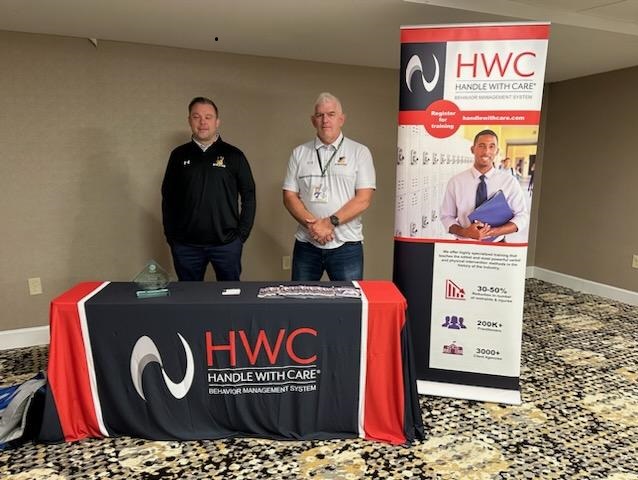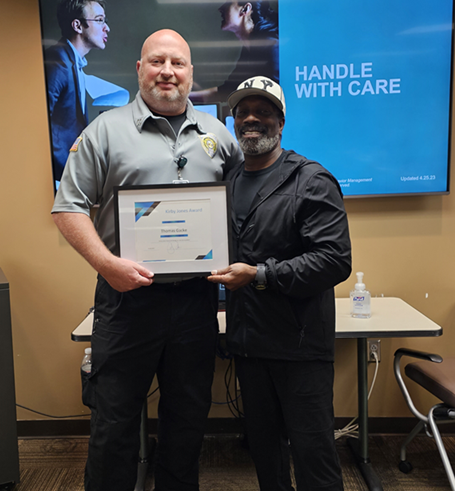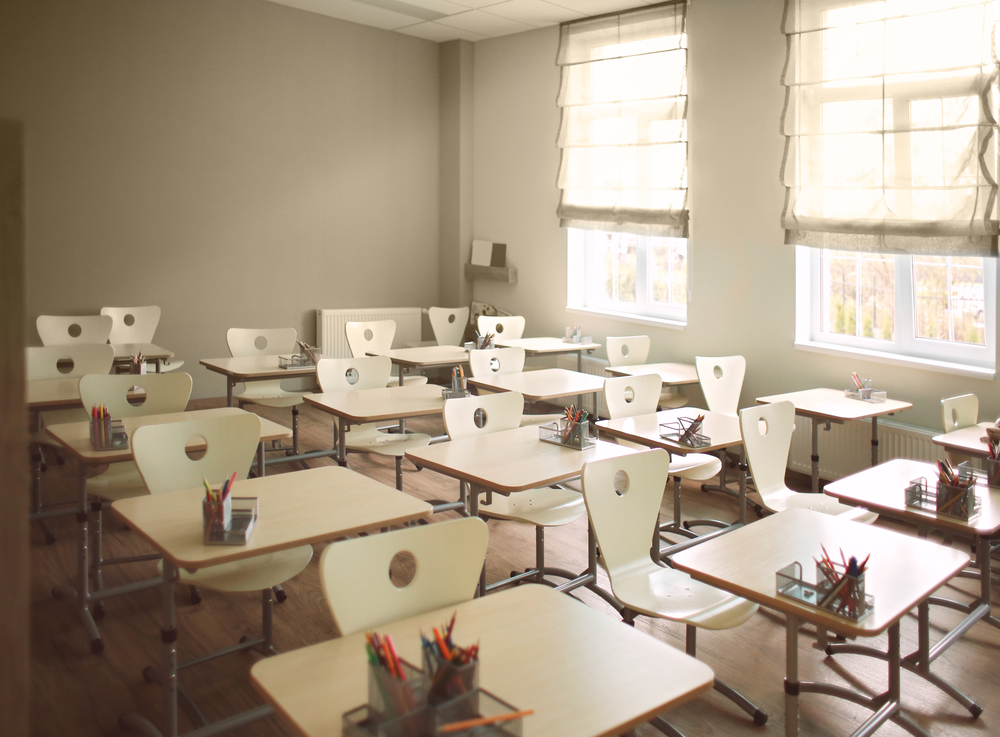Handle With Care being represented by Robert Lysek and Steve Flavell at a Pennsylvania School Conference.
Author: Hilary
Robert Wood Johnson Behavioral Health’s Kirby Jones Award
Each year Robert Wood Johnson Health hands out awards to our staff for outstanding efforts and performance throughout the year. One of our most sought after recognitions is the Kirby Jones Award that acknowledges our best de-escalator. Last year it was presented to officer James Jordan who has continued to step up and perform at a mentor level. All the officers presented with this award are selected to attend the HWC trainer class so they can feel the impact of Kirby 1st hand.
We are more than grateful that Kirby sets such an example for our team and I stand by the fact that he changes everyone that he comes in contact with. This year, Kirby presented his award to the RWJ team member for the values that he instills.
Liberty Hospital Creates the Kirby Jones Award for Best De-escalator
Liberty Hospital, Liberty, MO
Kirby Jones Award for the best de-escalator.
HWC Master Trainer, Kirby Jones, has been the HWC instructor for Liberty Hospital for many years and has become a part of the LH family.
What many do not know is there is a Kirby Jones Award for the best de-escalator. Hospitals award this to one person each year that has proven themselves time and time again in their de-escalation skills, treating each person as a whole human, mind, body and spirit.
In our first year participating in this prestigious honor, this award goes to Tom for going above and beyond every day.
Overview of Laws governing Restraint and Seclusion
Handle With Care has been providing training for school staff on how to manage student populations from pre-k12 since 1985.
There is generally a divide in schools between special education and general education with respect to behavior management and crisis intervention. The use of restraint in both general and special education are governed by 4 main bodies of law:
- Self Defense Laws: Federal, Constitutional and State laws protecting the right to defend self and others. Ingram v. Wright (SCOTUS). The State does not have the right to limit a person’s right to defend themselves or another in any manner that is reasonable. Bowers v. DeVit. The Supreme Court of the United States (SCOTUS) ruled that the right to self-defense does not terminate when a teacher or student enters the schoolhouse gates. See also, Tinker v. Des Moines Ind. Community School Dist., 393 U.S. 503, 506 (1969)
- Tort/Common Law: Courts have held that schools act in the place of parents (in loco parentis). As such, schools have a duty to maintain a safe environment conducive to education. Along with this doctrine comes a duty to train staff to handle foreseeable circumstances. It is foreseeable that children will lose their tempers and may engage in inappropriate behavior like fighting and throwing objects. There is a duty to train staff how to manage these foreseeable situations in a way that maintains a safe environment conducive to education.
- Treatment and Behavioral Plans (IEPs/BPs). This is the duty to provide professional judgment in developing educational and treatment plans. The Supreme Court has held that the professional duty rests exclusively with the professionals working directly with the [students]. Youngberg v. Romeo. 457 U.S. 307 (1982).
In addition to the above, special education students have the additional Federal laws that must be complied with:
- Americans with Disability Act (ADA), Individuals with Disabilities Education Act (IDEA), and the Rehabilitation Act Section 504 (504).
- The laws specific to special needs students protect their right not to be discriminated against because of their disability, and the right to a free and appropriate public education (FAPE) which includes IEPs.
How to Stop the School –> Prison –> Pipeline
Too many students are being diverted from school into the criminal justice system.
The school-to-prison pipeline “is one of our nation’s most formidable challenges, states the report.” “It arises from low expectations; low academic achievement; incorrect referral or categorization in special education; and overly harsh discipline, including suspension, expulsion, referral to law enforcement, arrest and treatment in the juvenile justice system.” And, the report notes, “Throughout these causes runs evidence of implicitly biased discretionary decisions, which, unintentionally, bring about these results.”
What the report fails to mention is that the causes are not generally biased discretionary decisions, but policies imposed on schools by legislators, regulators and school boards. There has been a movement across the country that takes the authority away from individual schools. Individual schools often no longer have the authority to make discipline, safety, educational or treatment decisions as their discretion has been usurped by policy makers and people removed from the classroom.
The result, while, perhaps, unintentional, was absolutely foreseeable.
When you take the authority and ability to maintain a safe and effective educational environment away from the school and educators, and place the authority in the hands of law enforcement, there will be a rise in the number of students entering the school –> to –> prison pipeline.
HWC in the News: School Security Prepares to Handle Crisis Situations with Care
How to handle crisis situations with care: That is what the security team at the Monticello Central School District will soon be learning. Time Warner Cable News’ Jackson Wang has more on the training program.
MONTICELLO, N.Y. — Every day, disputes, disagreements, and conflicts are bound to develop between students in a school. While most are harmless, school officials are concerned about the few that get verbally or physically violent.
“You never can tell these days where a threat may come from,” said Tammy Mangus, Monticello School District superintendent.
To be prepared, the district will soon be training its security team on how to handle disruptive situations and prevent them from escalating.
Restraint in School – what the law says.
The press is finally starting to report the actual law governing restraint use. This is a breath of fresh air. In the past the press has lied to the public reporting that many or most states have no laws on the use of restraint. A statement which is entirely false, as every state has laws on the use of restraint either in their Constitution, case law or statute.
Handle With Care has been disseminating the law on restraint since 1999 when we presented in front of the Attorney General for the State of Virginia, the Virginia Poverty Law Center, Southern Poverty Law Center, a stream of advocate attorneys, newspaper reporters, and many other high powered persons.
Every person at our initial presentation agreed with our legal analysis.
Since that time we have disseminated the laws governing restraint to agencies and schools across the country. To every Federal legislator and the vast majority of State Legislators.
We are very proud that unlike the press, advocates, political hacks, and unelected bureaucrats running government agencies, we stood our ground, disseminated the law, and educated schools and other organizations about the law and their rights under the law.
The article appeared in a U.K. publication – Schools Week, and was written by an attorney. Here’s what she says:
“A member of staff may use such force as is reasonable in the circumstances to prevent a pupil from committing an offence, causing injury to a person or themselves, causing damage to property or prejudicing the maintenance of good order and discipline.”
U.S. law is the the same.
All we can say is, it is about time the press is starting to get it right.
Virginia. Schools drafting their own restraint policy and totally disregarding the inane law their legislators passed in March
In March 2015 the Virginia State Legislature passed a bill stating that schools could not physically intervene unless a student was in danger of serious bodily harm. “Serious Bodily Harm” has a widely understood legal definition that includes the amputation of limbs, the loss of an eye or permanent disfigurement.
At the time this bill was being passed, we sent out correspondence and comments informing the legislature and schools that the bill was illegal as it violated a person’s inherent and unwaivable right to defend self and others by all reasonable means.
According to this article, schools are drafting policy in accordance with actual law and disregarding the bills the Virginia legislature just passed.
For instance, Williamsburg-James City County schools are considering a policy outlining how and when trained teachers, faculty and staff can restrain or separate a child to keep the student from hurting themselves or others. An intervention threshold much lower than the one mandated by their legislature.
Instead of following the new restraint bill the legislature passed, schools are instead relying on Virginia Statute 22.1-279.1 that allows the use of physical intervention to maintain a safe educational environment.
Schools and educators should not have to wait until a student risks “physical injury that creates a substantial risk of death; extreme physical pain; or that causes protracted and obvious disfigurement, or protracted loss or impairment of the function of a bodily member, mental faculty or organ” before intervening.
HWC fully supports theses schools. We commend them for having the sense and fortitude to stand up and do what is morally and legally right.
SC. Officer throws student in South Carolina classroom arrest
Sadly, this video demonstrates what happens when teachers and school administrators become so disempowered that they feel it necessary to call the police to manage a fairly simple act of defiance to a legitimate request. Two well-trained teachers could have managed this student’s behavior with far less force than the Deputy Sheriff.
She was acting as a passive resister and was clearly playing to her peers. Rather than fighting to remove this student from her seat, HWC would have advised the school to consider two other options: 1) slowly (and without anger) slide the student and her desk into the hall; closing and locking the door behind her or 2) leave her in her seat and move the rest of the class to another room.
In both cases, she would have been left with adult supervision (but without her peer audience) to answer to whatever thoughtful and appropriate behavioral consequences had been prescribed in her IEP/IBP for defiant behavior.
The compliments keep coming. See below for Kyle’s response.
Compliment for HWC Master Trainer Kyle Withers,
“I just wanted to let you know that at my school today, I had to utilze my verbal deescalation and relationship skills with a student. Unfortunately the student was unable to keep himself safe on his own, so I used the modified child restraint to help keep him safe.
I was so glad that not only was I there when the situation occurred, but that I had the skills from Handle With Care this week to help keep a student safe.
Just wanted to let you know and say thank you once again!
M.O. – School Social Worker
HWC and the PRT is the best thing invented since sliced bread, canned beer, and those very lightweight door stops. 😀 Emails like the one above are my true compensation, and I feel so very fortunate and honored to still be allowed to spread such a valuable philosophy and be a part of something so magical.
– Kyle Withers, HWC Master Trainer









